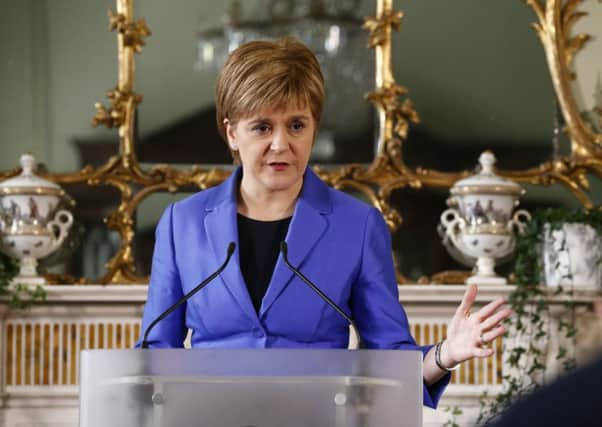Leaders: Sturgeon's presence in Europe is significant


Now at last, after First Minister Nicola Sturgeon’s visit to Brussels, we are getting some sense of what Europe’s views may be on Scotland’s future concerning Europe and the EU.
There was absolutely no formal reason for her to travel to Brussels, or for Brussels to listen to her, but she did.
Advertisement
Hide AdAdvertisement
Hide AdAnd they listened. Jean-Claude Juncker, the European Commission president, said that Scotland had won the right to be listened to. However, the mood music around such statements has been less positive.
Spanish Prime Minister Mariano Rajoy and French president Francois Hollande have both been swift to thrown cold water on the idea of Scotland being allowed to negotiate a separate deal.
But then Mr Rajoy was always going to say something like that because he has his own internal difficulties from his own separatist movements in Catalonia and the Basque Country and he will not want to give them any encouragement whatsoever. So his position is dictated by self interest – as indeed is everyone else’s.
President Hollande is voicing similar views and the consensus seems to be that this was an internal matter for the UK and not a matter for Europe. Tellingly, European Council president Donald Tusk did not agree to meet Ms Sturgeon, saying it would not be appropriate.
However, as Ms Sturgeon goes exploring what options there might be for Scotland to have a better ongoing relationship with the EU, it still remains unclear as to what a better deal for Scotland would look like and how it would be achieved in practical terms. Is it possible that a Scotland still in the UK could have some sort of special relationship with the EU that is more beneficial than that offered to the UK? That does not seem feasible and the probable reality is that any different relationship will be contingent on Scottish independence. That then opens up a further debate about how any deal with the European Union would work and what its terms would be.
In 2014 the view taken by the EU was that an independent Scotland would have to leave it and then reapply for membership. However, that stance might change, given there probably won’t be any UK politicians putting pressure on the rest of Europe next time around.
As well as the EU’s view on Scotland, we are also beginning to get a sense of its continuing relationship with the UK. As expected, the EU seems to want to tie membership of the single market to freedom of movement of labour.
Ms Sturgeon’s description of the situation we are in now as “uncharted territory” is accurate understatement. Times are changing and many established beliefs, boundaries and protocols are being challenged.
Advertisement
Hide AdAdvertisement
Hide AdBut all is still to play for. The EU’s laws, treaties and rules governing lives and economies and national interactions are all at their root an expression of political will. If there’s a political will within the collective membership of the EU, there could be a way forward that at present would be unthinkable. Because let’s face it, the previously unthinkable is now happening all around us.
Turkey must increase security
The attack at Ataturk airport in Istanbul was chilling, ruthless and brutal. Europe’s third busiest airport was packed with international travellers, Turkish citizens and airport staff who were powerless against their killers who wore suicide vests and were armed with automatic guns.
This was the sixth major terrorist attack launched against Turkey this year, beginning with the bombing near Istanbul’s world-famous Blue Mosque in January.
It is extremely difficult to act against such random acts of terrorism. However, what is vital is collating intelligence to determine where the cells are based and using surveillance information to track and thwart those whose intentions are to destabilize an entire country and its economy for its own ends.
Turkey’s border with Syria means that it is within easy reach of hotbeds of IS activity.
It is therefore vital that Turkey takes immediate action to invest in physical security to protect innocent people visiting its cities and bringing much-needed currency to the country.
This translates into erecting physical barriers around tourist attractions and setting up “stop and search” points to make sure that those carrying bombs and guns will be stopped before they get in to crowded areas. This will be costly and disruptive and ultimately will never give a complete guarantee of safety because terrorists will simply move their targets to places where they think they will have a better chance of success.
But it will give some degree of safety and it will go a long way to providing confidence for the public – both domestic and visitors – in as much as that can be given in the face of such inhumanity.